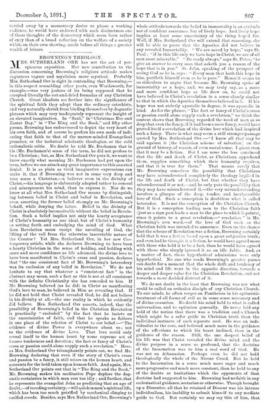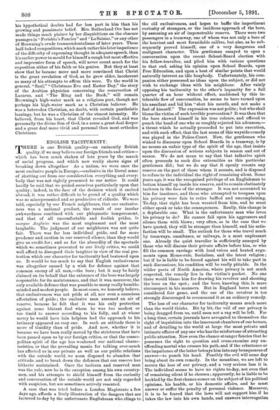BROWNING'S THEOLOGY.
-J.-AIRS. SUTHERLAND ORR has not the art of per- spicuons exposition. Her new contribution to the discussion concerning Browning's religious attitude makes vagueness vaguer and mysticism more mystical. Probably Mrs. Sutherland Orr is right in contending that Browning,— in this respect resembling other poets, even Wordsworth, for example,—was very jealous of its being supposed that he accepted literally the cut-and-dried formulas of any Christian Church. Great idealists see farther into the significance of the spiritual faith they adopt than the ordinary catechists, and very naturally shrink from binding themselves by dogmatic phrases which may very inadequately represent the insight of an elevated imagination. In "Saul," in " Christmas Eve and Easter Day," in " The Ring and the Book," and fifty other poems, Browning has endeavoured to depict the very heart of his own faith, and of course he prefers his own mode of indi- cating that faith to that of the narrow-minded Evangelical preacher, or the technical scholastic theologian, or the cold rationalistic critic. No doubt he told Mr. Buchanan that in his (Mr. Buchanan's) sense of the term. he did not profess to be a Christian ; but, as Mrs. Sutherland Orr puts it, we want to know exactly what meaning Mr. Buchanan had put upon the term, before we can attach any great importance to this asserted denial. It is as plain as vivid imaginative expressions can make it, that if Browning was not in some very deep and true sense a Christian,—a believer even in the divinity of Christ,—his language is elaborately adapted rather to conceal and misrepresent his mind, than to express it. Nor do we know at all what Mrs. Sutherland Orr means by distinguish- ing between belief in Christ and belief in Revelation, and even asserting the former belief strongly on Mr. Browning's behalf, while denying the latter. Belief in the divinity of Christ is absolutely inconceivable without the belief in Revela- tion. Such a belief implies not only the hearty acceptance of Christ's humanity as our ideal, but of Christ's humanity as setting forth and embodying the mind of God. What does Revelation mean except the unveiling of God, the lifting of the veil from the otherwise inscrutable nature of the Creator ? Yet Mrs. Sutherland Orr, in her new Con- temporary article, while she declares Browning to have been a hearty Christian in the sense of holding, and holding with more and more confidence as life advanced, the divine love to have been manifested in Christ's cross and passion, declares that " the one consistent fact of Mr. Browning'a heterodoxy was its exclusion of any belief in Revelation." We do not hesitate to say that whatever a "consistent fact" in the abstract may mean, such a fact as this is not at all consistent with the definite Christianity she has conceded to him. If Mr. Browning believed (as he did) in Christ as manifesting God's love to man, he believed in Him as revealing God. If he did not hold that Christ revealed God, he did not believe in his divinity at all,—the one reality in which he evidently did believe. Mrs. Sutherland Orr asserts, indeed, that the possibility of Browning's belief in the Christian Revelation is practically " excluded" by the fact that he insists on the uncertainties of faith, and that he speaks as follows in one place of the relation of Christ to our belief :—" The evidence of divine Power is everywhere about us ; not so the evidence of divine Love. That love could only reveal itself to the human heart by some supreme act of human tenderness and devotion ; the fact or fancy of Christ's cross or passion could alone supply such a revelation." Here, as Mrs. Sutherland Orr triumphantly points out, we find Mr. Browning declaring that even if the story of Christ's cross and passion be a fancy, it still seizes on the human heart, and accounts for the hold taken upon human faith. And again, Mrs. Sutherland Orr points out that in " The Ring and the Book," Mr. Browning makes his meditative Pope deplore the dog- matic certainties in which men rest too idly ; and further, that he represents the evangelist John as predicting that an age of doubt,—of receding certainty,—will quicken men's spiritual life, which has been too much petrified by mechanical clinging to ossified creeds. Besides, says Mrs. Sutherland Orr, Browning's whole attitude towards the belief in immortality is an attitude not of confident assurance, but of lively hope. And lively hope implies at least some uncertainty of the thing hoped for. Well, if Mrs. Sutherland Orr will extend that reasoning, she will be able to prove that the Apostles did not believe in any revealed Immortality. " We are saved by hope," says St. Paul ; " if in this life only we have hope in Christ, we are of all men most miserable." " Be ready always," says St. Peter, "to give an answer to every man that asketh you a reason of the hope that is in you." St. John, speaking of the prospect of seeing God as he is, says : " Every man that bath this hope in him, purifieth himself even as he is pure." Hence it seems to us ridiculous to argue that because Mr. Browning spoke of immortality as a hope, and, we may truly say, as a more and more confident hope as life drew on, he could not have believed in Christ's revelation in a sense closely similar to that in which the Apostles themselves believed in it. If his hope was not strictly apostolic in degree, it was apostolic in kind. As for the phrase, The fact or fancy of Christ's cross or passion could alone supply such a revelation," we think the context shows that Browning regarded the need of man as so deep that even the fancy, if it had been a mere fancy, would have proved itself a revelation of the divine love which had inspired such a fancy. There is what may seem a still stronger passage quoted by Mrs. Sutherland Orr :—" I know all that may be said against it [the Christian scheme of salvation] on the ground of history, of reason, of even moral sense. I grant even that it may be a fiction. But I am none the less convinced that the life and death of Christ, as Christians apprehend th:m, supplies something which their humanity requires, and that it is true for them." That means surely that Mr. Browning conceives the possibility that Christians may have misunderstood completely the theology implied in the life and death of Christ, but that whether they have misunderstood it or not,—and he only puts the possibility that they may have misunderstood it,—the very misunderstanding involves a glimpse of the deep, tender, and inexhaustible love of God. Such a conception is doubtless what is called heterodox. It is not the conception of the Christian Church. But it is a conception leading men to the Christian faith (just as a sign-post leads a man to the place to which it points), since it points to a great revelation,—" revelation " is Mr. Browning's own word,—of the love of God such as the Christian faith was intended to announce. Even on the chance that the scheme of Revelation was a fiction, Browning certainly held that it was a fiction based upon a great subjective truth ; and even had he thought it a fiction, he would have agreed more with those who held it to be a fact, than he would have agreed
with those who simply ignored it as an idle fable. And, as a matter of fact, these hypothetical admissions were only hypothetical. No one who reads Browning's greater poems can doubt for a moment that the whole drift and tendency of his mind and life went in the opposite direction, towards a deeper and deeper value for the Christian Revelation, and not towards a more decided distrust of it.
We do not doubt in the least that Browning was not what could be called an orthodox disciple of any Christian Church. To our minds, he often verges on Pantheism in his optimistic treatment of all forms of evil as in some sense necessary and of divine causation. No doubt his mind held to what is called universalism, and to optimism generally. He never laid any bold of the notion that there was a tradition and a Church which might be a safer guide to Christian truth than the individual instincts of each separate soul. He was an indi- vidualist to the core, and believed much more in the guidance of the affections to which his heart inclined, than in the guidance of the reason. Still, the one deepest belief of his life was that Christ revealed the divine mind and the divine purpose in a sense so profound, that the doctrine of the Incarnation was to him a real word of God. He was not an Athanasian. Perhaps even he did not hold theologically the whole of the Nicene Creed. But he held to the Incarnation in a sense much more eager and much more progressive and much more constant, than he held to any of the doubts or hesitations which the opponents of that doctrine had suggested to him. Browning had no faith in any ecclesiastical guidance, sectarian or otherwise. Though brought up a Dissenter, all that be retained of Dissent was his intense individualism, his inability to submit himself to any mediate guide to God. But certainly we may say this of him, that
his hypothetical doubts had far less part in him than his growing and passionate belief. Mrs. Sutherland Orr has not made things much plainer by her disquisitions on the obscure passages in "Ferisbta's Fancies" and "La Saisiaz," or any other of Browning's crude transcendentalisms of later years. These half-baked compositions, which mark rather his later impatience of the difficulty of expressing thought in adequate speech, than his earlier power to mould for himself a rough but most effective and impressive form of speech, will never count much for the exposition either of his faith or his genius. But they at least show that he became more and more convinced that Christ is the great revelation of God, as he grew older, incoherent as many of his attempts to affirm this were. To the world in general, " Saul," " Christmas Eve and Easter Day," the story of the Arabian physician concerning the resurrection of Lazarus, and The Ring and the Book," will remain Browning's high-water mark as a religious poet, though not perhaps his high-water mark as a Christian believer. He was a heterodox Christian, no doubt, with certain pantheistic leanings, but he was a Christian of the utmost intensity. He believed, from his heart, that Christ revealed God, and was personally the divine Son of God, in a sense a great deal deeper and a great deal more vivid and personal than most orthodox Christians.



















































 Previous page
Previous page